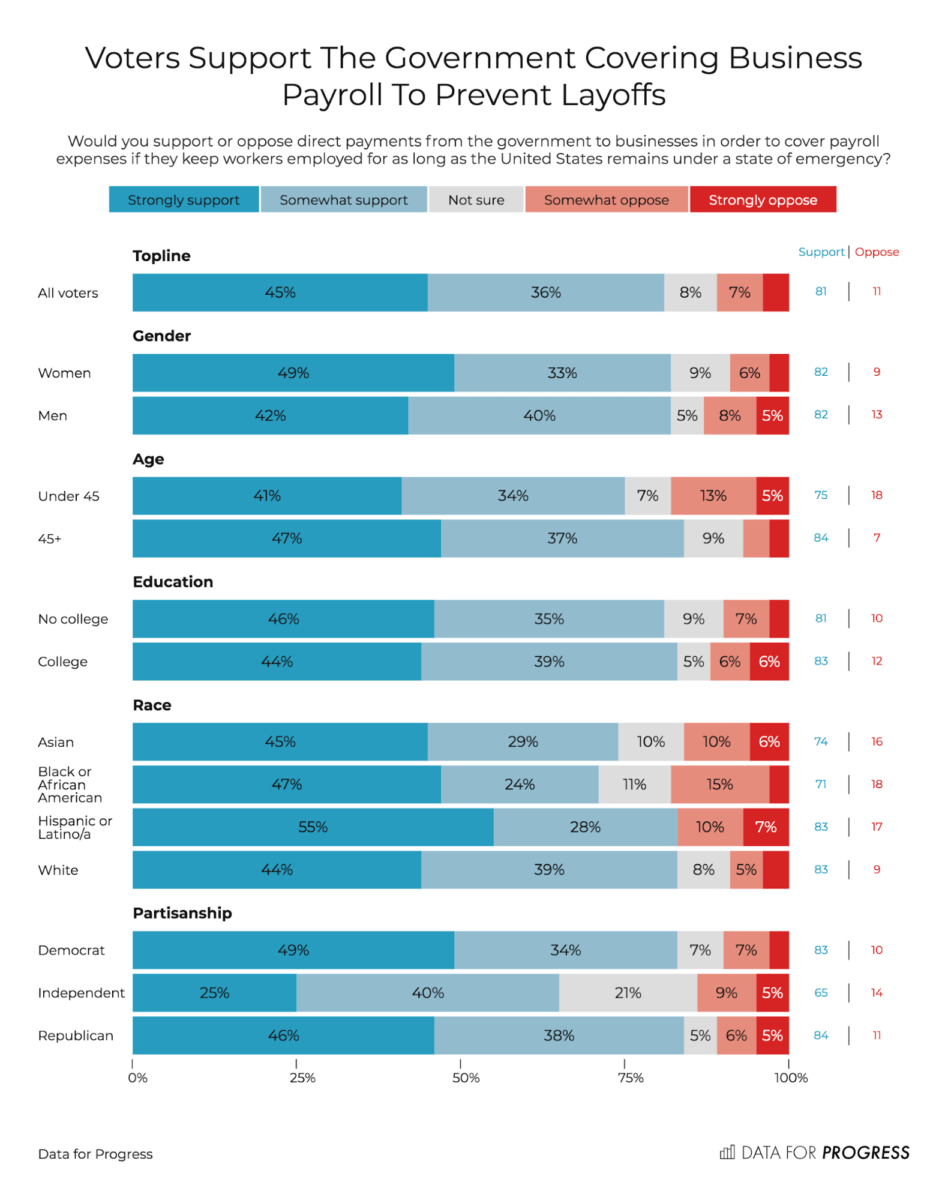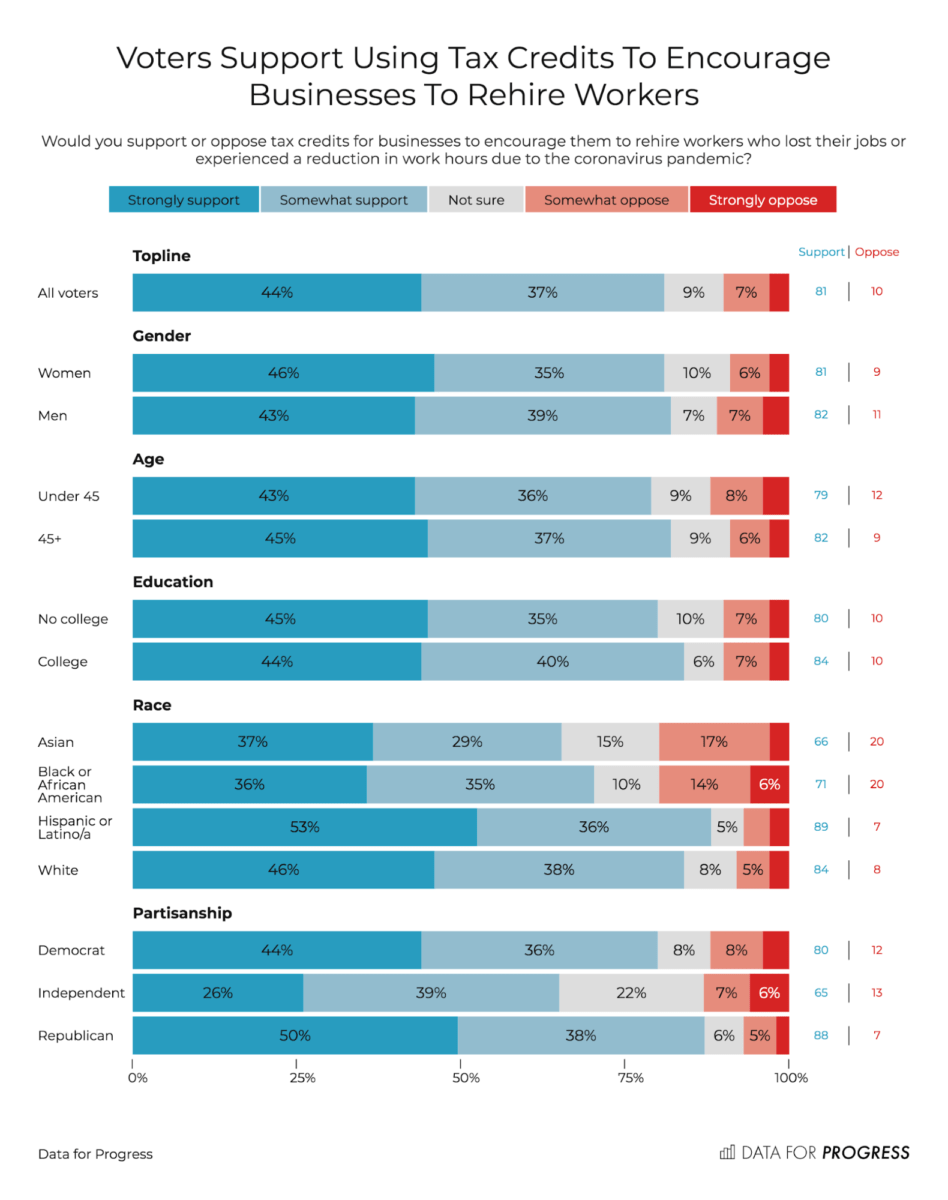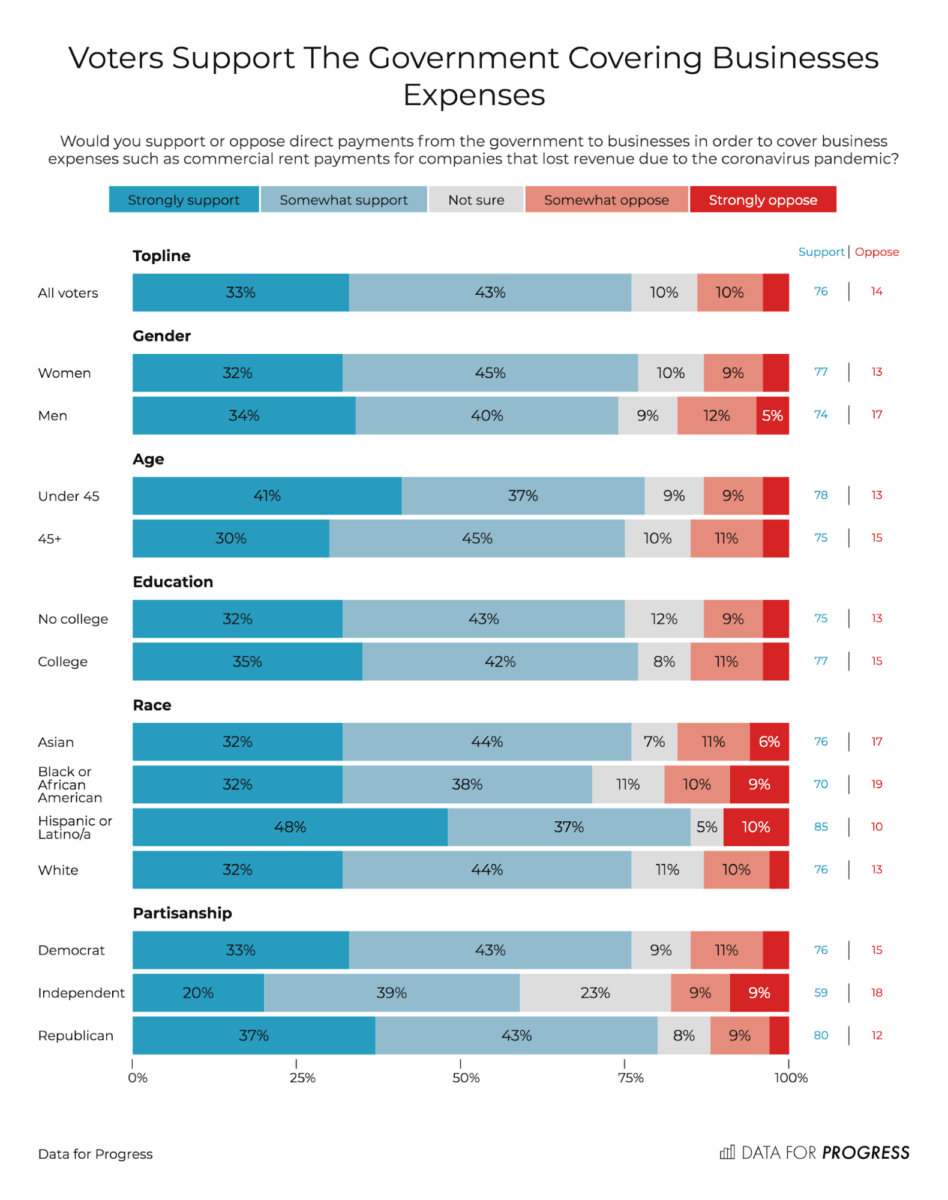Voters Want Guaranteed Paychecks Through The Pandemic
Voters want the government to take common sense measures that meet the scale of the crisis and preserve the economy so that when the coronavirus is contained, economic life can resume as rapidly as possible. It’s time for lawmakers in Washington, D.C. to listen.

This research and analysis is part of our Discourse series. Discourse is a collaboration between The Appeal, The Justice Collaborative Institute, and Data For Progress. Its mission is to provide expert commentary and rigorous, pragmatic research especially for public officials, reporters, advocates, and scholars. The Appeal and The Justice Collaborative Institute are editorially independent projects of The Justice Collaborative.
While other developed countries have mobilized national resources to directly pay for workers’ wages and business expenses, Democrat and Republican leadership seem to have accepted the inevitability of mass unemployment and small business failures in response to the Coronavirus crisis. The economic stimulus packages Congress has passed thus far have mitigated against the financial insecurity of job loss through extending unemployment insurance and have provided some support to aid businesses, especially large, publicly-traded ones, but without any enforceable requirement that these businesses use the funds to keep workers on the payroll. As a result, layoffs continue to mount, reaching nearly 17 million in just the last three weeks.
Absent policies bold enough to meet the scale of the crisis, populists in both parties – including Representative Pramila Jayapal and Senator Josh Hawley – are proposing a new pathway to guarantee workers their paycheck, rehire people who lost their jobs or faced a reduction in hours, and cover basic business expenses such as rent, so that workers have a job to return to when the economy reopens. These “paycheck guarantee” proposals, modeled after the payroll grants Congress passed in the CARES Act to keep aviation workers paid and connected to their healthcare despite plummeting air travel, would cover workers in all sectors impacted by social distancing-related revenue drops.
The most ambitious legislation comes from Representative Jayapal. As Li Zhou of Vox explains, Jayapal’s bill would cover in the form of grants — not loans — 100 percent of base payroll, up to $100,000, for three months. If the crisis continues beyond the three-month window covered by the bill, the grants would automatically renew on a monthly basis. This sort of paycheck protection program mimics the approach adopted by other countries, like Denmark. Importantly, Jayapal’s legislation also includes a proposal to cover a portion of business expenses, such as rent. Keeping businesses from going under is a necessary prerequisite to keeping employees on the job–providing for payroll and essential business expenses is the best way to ensure that the economy can recover when the pandemic subsides.
Although Americans historically favor more redistribution and government intervention during economic downturns, paycheck guarantees have never been tried before in the United States and are therefore largely unknown to the public. As part of an April 2020 survey, Data for Progress, in partnership with The Justice Collaborative Institute, tested attitudes towards this new policy. We found that registered voters overwhelmingly support them. This includes strong majority support among Republicans, Democrats, and independents, among people who live in rural, suburban, and urban areas, as well as among white, Latino, and black voters.
The first proposal we looked at is a government-backed program to guarantee paychecks, which would allow workers to keep their jobs and to get back to work when the economy eventually can “reopen.” Specifically, we asked voters the following question:
Would you support or oppose direct payments from the government to businesses in order to cover payroll expenses if they keep workers employed for as long as the United States remains under a state of emergency?
We found high levels of support for this proposal across a host of measured demographics; support was also bipartisan. Overall, voters support it by a 70-percentage-point margin (81 percent support, 11 percent oppose). Support is largely consistent regardless of gender or age. Those over the age of forty-five are slightly more supportive of the proposal (84 percent support, 7 percent oppose) than those under forty-five (75 percent support, 18 percent oppose). Attitudes are generally stable by race. When it comes to partisan attitudes, both Democrats and Republicans support the proposal by a 73-point margin.

Second, we looked at attitudes toward a tax credit program that would incentivize businesses to rehire workers that the business laid off or whose hours were reduced. Both the Hawley and Jayapal proposals contain provisions to encourage the rehiring of workers that have been laid off since the start of the pandemic, in addition to provisions designed to cover the payroll of workers who are still employed. Specifically, we asked voters:
Would you support or oppose tax credits for businesses to encourage them to rehire workers who lost their jobs or experienced a reduction in work hours due to the coronavirus pandemic?
We found overwhelming support for this proposal. By a 71-point margin, voters support providing tax credits to businesses. Levels of support are largely stable regardless of gender, age, and educational attainment. Latinos are particularly enthusiastic about this proposal, backing it by an 82-point margin (89 percent support, 7 percent oppose). Support for this proposal is also bipartisan. Republicans support it by an 81-point margin (88 percent support, 7 percent oppose), while Democrats support it by a 68-point margin (80 percent support, 12 percent oppose).

Finally, we looked at support for the government providing direct payments to businesses to cover expenses such as commercial rent payments if the business lost revenue due to the coronavirus pandemic. Specifically, we asked voters:
Would you support or oppose direct payments from the government to businesses in order to cover business expenses such as commercial rent payments for companies that lost revenue due to the coronavirus pandemic?
Again, we find considerable enthusiasm for this policy. Attitudes were largely consistent regardless of gender, age, educational attainment, and race. Support was also bipartisan. Democrats support the proposal by a 61-point margin (76 percent support, 15 percent oppose), while Republicans back it by a 68-point margin (80 percent support, 12 percent oppose).

To date, some economic relief efforts have been made — including one bill with a price tag of roughly $2 trillion — and what’s becoming increasingly clear is that what we have accomplished so far isn’t enough, especially not for workers and small businesses. Voters want the government to take common sense measures that meet the scale of the crisis and preserve the economy so that when the coronavirus is contained, economic life can resume as rapidly as possible. It’s time for lawmakers in Washington, D.C. to listen.
From April 8, 2020 to April 9, 2020, Data for Progress conducted a survey of 1097 likely voters nationally using web panel respondents. The sample was weighted to be representative of likely voters by age, gender, education, urbanicity, race, and voting history. The survey was conducted in English. The margin of error is ± 2.9 percent.
